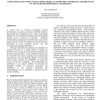Free Online Productivity Tools
i2Speak
i2Symbol
i2OCR
iTex2Img
iWeb2Print
iWeb2Shot
i2Type
iPdf2Split
iPdf2Merge
i2Bopomofo
i2Arabic
i2Style
i2Image
i2PDF
iLatex2Rtf
Sci2ools
WSC
1998
1998
Using Simulation with a Logit Choice Model to Assess the Commercial Feasibility of an Advanced Environmental Technology
A critical issue in advanced technology product development is assessing economic feasibility based on the potential for commercial success. This is particularly difficult for an environmental product that has intangible benefits such as reduced air emissions. Corporate confidentiality compounds this problem since many of the target customers of the new product do not allow product developers to access important process, cost, and environmental operating information. This paper describes the application of simulation to enhance the power of a choice model to evaluate the feasibility of an advanced environmental technology for the metal casting industry. Using simulated industry data that describes the critical operating and environmental characteristics of lead technology adapters, a binary logit choice model estimates the probability of commercial success for the new technology. This methodology has application to the general problem of assessing the intangible benefits of advanced t...
Advanced Technology | Advanced Technology Product | Intangible Benefits | Modeling And Simulation | WSC 1998 |
| Added | 01 Nov 2010 |
| Updated | 01 Nov 2010 |
| Type | Conference |
| Year | 1998 |
| Where | WSC |
| Authors | Paul J. Kauffmann |
Comments (0)

